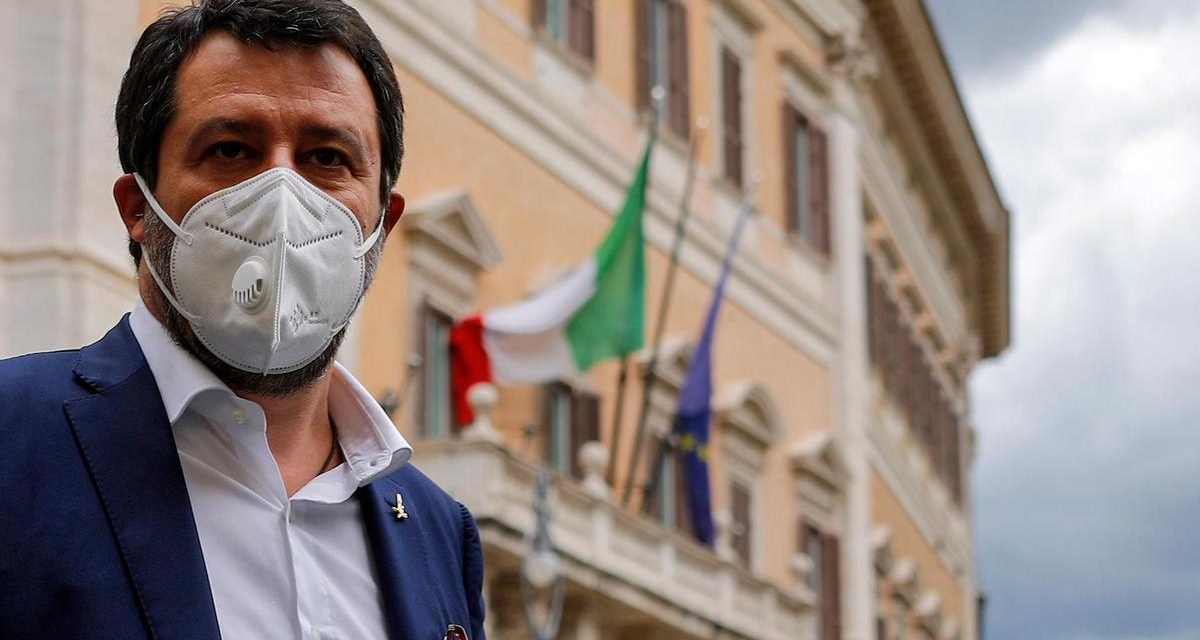Matteo Salvini, the leader of Italy’s League, outside the Chamber of Deputies, Rome, Italy (EPA)
Each Research Fellow in our Populism in Action team has written an analysis explaining the impact of the pandemic on the countries covered by our research: Belgium, Switzerland, Italy, and Belgium.
The team has focused on the strategies adopted by populist parties within these countries either to challenge their governments’ responses to the pandemic or to support them.
Judith Sijstermans on Belgium’s Flemish Interest: Coronavirus Shapes Belgium’s Government and Populist Opposition
Adrian Favero on the Swiss People’s Party: Coronavirus Brings Rare Unity Among Switzerland’s Parties
Mattia Zulianello and Daniele Albertazzi on Italy’s League: Populism and the Collapse of Italy’s Coronavirus Truce
Niko Hatakka on the Finns Party: Coronavirus Aftermath Is Likely to Unite Finland’s Right-Wing Parties
What becomes apparent reading these analyses is the extent to which the parties we study remain fundamentally “other” vis-à-vis their competitors, refusing to “toe the line” for longer than a few weeks, even in times of crisis. Hence any moderation of tones and “rallying behind the flag” caused by the pandemic has in the end been rather short-lived.
The Swiss People’s Party, the League and the Finns Party all initially chose to back the efforts of their governments, as Coronavirus spread through their countries. A member of the power-sharing executive, the Swiss People’s Party turned down the volume, recognizing a yearning for unity among the population and the business community. The Finns Party and the League also refrained from causing major clashes with their opponents. In the Finnish case, the party even tried to rein in their ranks so that they would not take aim at the government’s efforts to contain the epidemic.
According to our research team, these parties’ aspiration to govern is an important factor to be considered in order to understand this behavior (with the exception of the Swiss People’s Party, which is already in government). While these parties still need to be seen to be responsive to their constituents’ needs, they also want to build a reputation for responsibility.
And yet in every country, the truce between populists and the government has been short-lived. Shortly after our analyses were posted, both the Swiss People’s Party and the League started calling for a very speedy end to the lockdowns, criticizing their governments for not acting fast enough. The Swiss People’s Party continues to serve in government while at the same time attacking the classe politique (the political establishment). From the opposition benches, the League is again raising its voice on EU-related issues, as the first details were made public of an agreement that European governments are seeking on a coordinated response.
Populist parties have realistic chances to govern in many European countries. The Swiss People’s Party is a long-standing member of the power-sharing executive, and the League has been involved in government five times during the last 25 years, although it finds itself in opposition right now. Treating them as “challenger parties”, while defining their opponents as “mainstream/established”, has become an anachronism. However, this does not mean that populist parties have been “tamed”, either in their rhetoric or their policy proposals.

Tom Van Grieken, leader of the Belgian right-wing populist party Vlaams Belang
The “New Mainstream”
Watching what is happening in Finland helps us reflect on this situation where populists are increasingly the “new mainstream”, and yet are not compromising on their ideology and communication strategy. The Finns Party was declared unfit to share government responsibilities by potential allies as recently as 2017, as the leader it chose, Jussi Halla-aho, is widely seen as a radical. However, as the country entered lockdown, he told activists and supporters to avoid online confrontation. This has likely contributed to a re-thinking of the strategy of marginalization by the center-right Coalition Party that may well open the door to closer collaboration with the Finns Party in the future, even if the latter is no less radical now than it was in 2017.
The clearest example of a party that was not tempted by the idea of signing a short truce with its country’s government is that of Belgium’s Flemish Interest: the party has never served in government so far due to a strict cordon sanitaire put in place by its opponents, and has not been invited to any of the negotiations around the emergency government addressing the pandemic.
The Flemish Interest has never relented in its attacks against the emergency executive, accusing the government of incompetence and highlighting what it said were the many mistakes that the latter made in handling the crisis. Yet only a year ago it moved closer than ever to joining a government coalition, and the need to transition from opposition to government is explicitly addressed in the most recent book written by the party’s leader: “And Now It is Up to Us”.
While populists are increasingly parties of government, they are not being tamed. The opposite is increasingly the case, as non-populist parties take a leaf out of the populist box of tricks and imitate their more vociferous competitors in countries such as the UK, Austria, France, the Netherlands, and many others.
Populists now have a substantial media presence and increasingly shape the public agenda in contemporary Europe. Expect them to go back to their pre-pandemic noisy selves in a few weeks (if they have not already done so), as the devastating economic and social impact of the lockdowns come to light. Also expect their competitors to keep co-opting their style and ideas as they try to keep up with their populist opponents.

